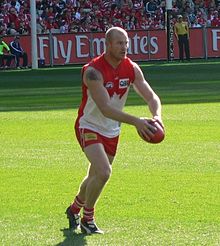| Barry Hall | |||
|---|---|---|---|
 Hall playing for the Swans | |||
| Personal information | |||
| Full name | Barry Andrew Hall | ||
| Nickname(s) | Bazza, Big Bad Barry | ||
| Date of birth | 8 February 1977 | ||
| Place of birth | Victoria | ||
| Original team(s) | Murray Bushrangers (TAC Cup) | ||
| Draft | No. 19, 1995 national draft | ||
| Height | 194 cm (6 ft 4 in) | ||
| Weight | 104 kg (229 lb) | ||
| Position(s) | Forward | ||
| Playing career1 | |||
| Years | Club | Games (Goals) | |
| 1996–2001 | St Kilda | 88 (144) | |
| 2002–2009 | Sydney | 162 (467) | |
| 2010–2011 | Western Bulldogs | 39 (135) | |
| Total | 289 (746) | ||
| International team honours | |||
| Years | Team | Games (Goals) | |
| 2003–2006 | Australia | 4 | |
|
1 Playing statistics correct to the end of 2011. | |||
| Career highlights | |||
| |||
| Sources: AFL Tables, AustralianFootball.com | |||
Barry Andrew Hall (born 8 February 1977) is a former professional Australian rules footballer who played for the St Kilda Football Club, Sydney Swans and Western Bulldogs in the Australian Football League (AFL). He is considered to be one of the best forwards of the modern era, being named All Australian, leading his club's goalkicking on eleven occasions and captaining the Sydney Swans to their 2005 AFL Grand Final victory. In July 2011, Hall created history by becoming the first player to kick 100 goals for three AFL teams.
Hall began his career at the St Kilda Football Club where he twice led the club's goalkicking in 1999 and 2001. He is best known for his career with the Sydney Swans. He was one of the Swans' best players during his time at the club, topping the club goalkicking from 2002 to 2008 and co-captaining the side from 2005 to 2007, including the club's drought breaking premiership in 2005. He also featured heavily in the AFL's promotion in Sydney, gaining a similarly high-profile to Tony Lockett[1] which saw him featured in a 2006 AFL and Swans joint promotion known as "Barry Hall Hall".
The former junior boxing champion's AFL career has been marred by a reputation for on-field aggression, which has earned him the label of football "wild man" and he became one of the most feared players on the field. Several controversial and highly publicised incidents (often called "brain snaps" by the media) and tribunal appearances have interrupted his career and contributed to a change of clubs.
- ^ "Barry Hall hits the international headlines - World Footy News". worldfootynews.com. Retrieved 4 April 2014.